2026年中考《英语》复习课件:专题三 第8讲 Units 1~2 (共55张PPT)
文档属性
| 名称 | 2026年中考《英语》复习课件:专题三 第8讲 Units 1~2 (共55张PPT) |

|
|
| 格式 | pptx | ||
| 文件大小 | 422.3KB | ||
| 资源类型 | 教案 | ||
| 版本资源 | 人教新目标(Go for it)版 | ||
| 科目 | 英语 | ||
| 更新时间 | 2025-07-17 10:42:23 | ||
图片预览

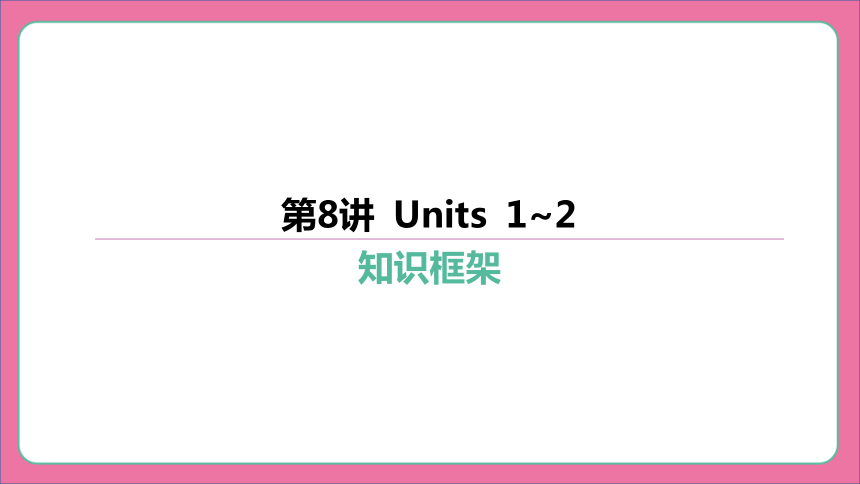
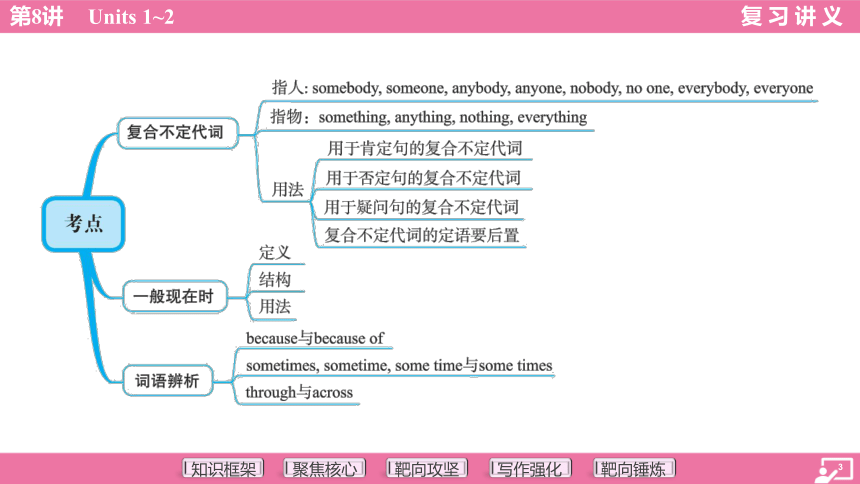
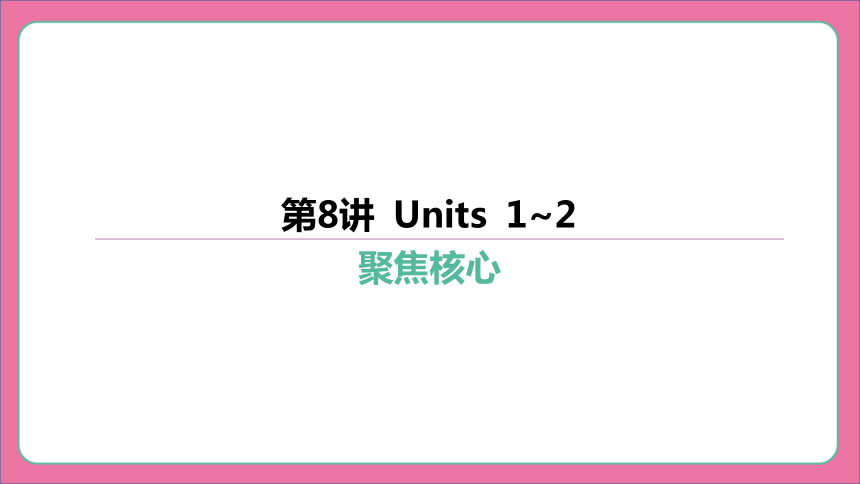
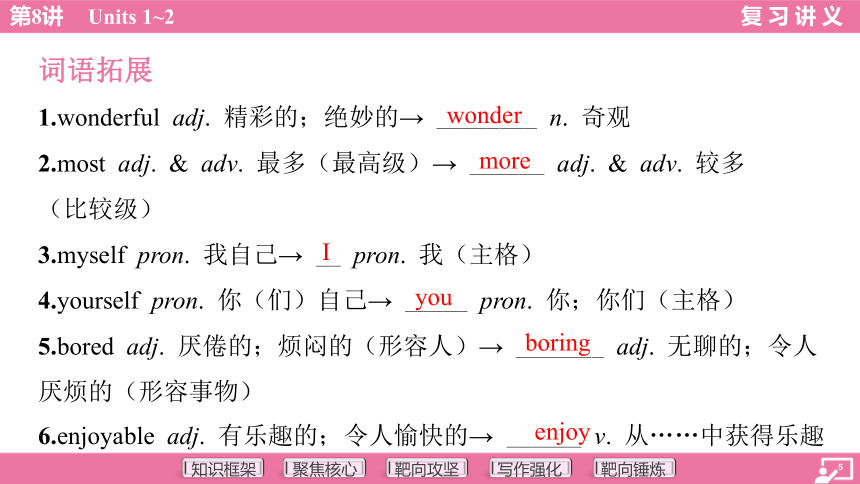
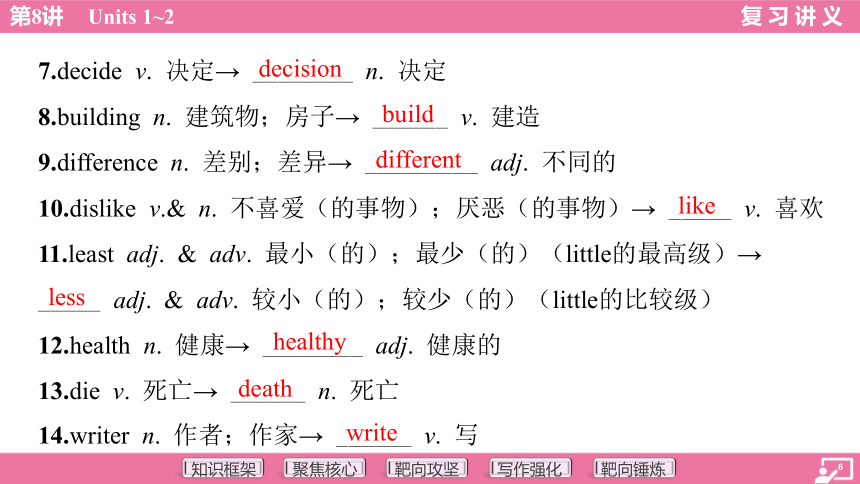
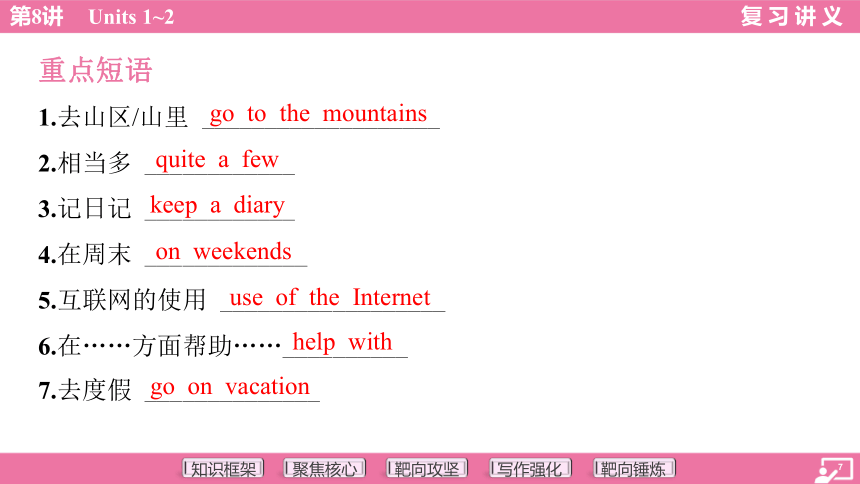
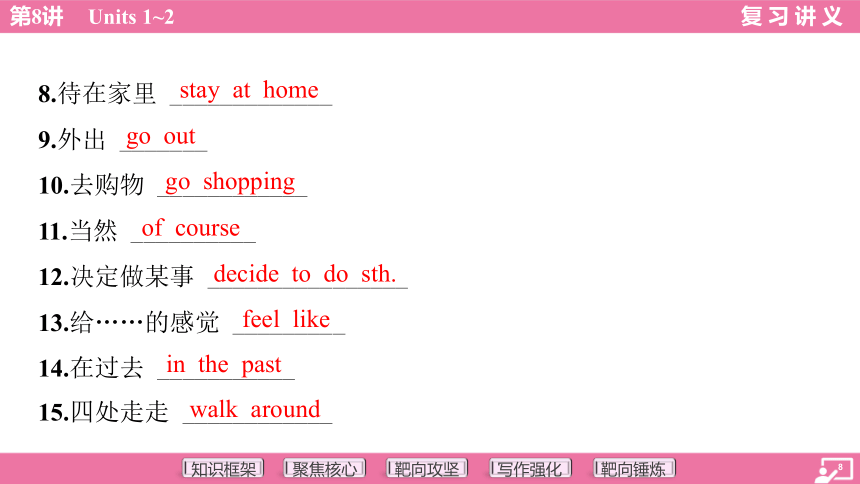
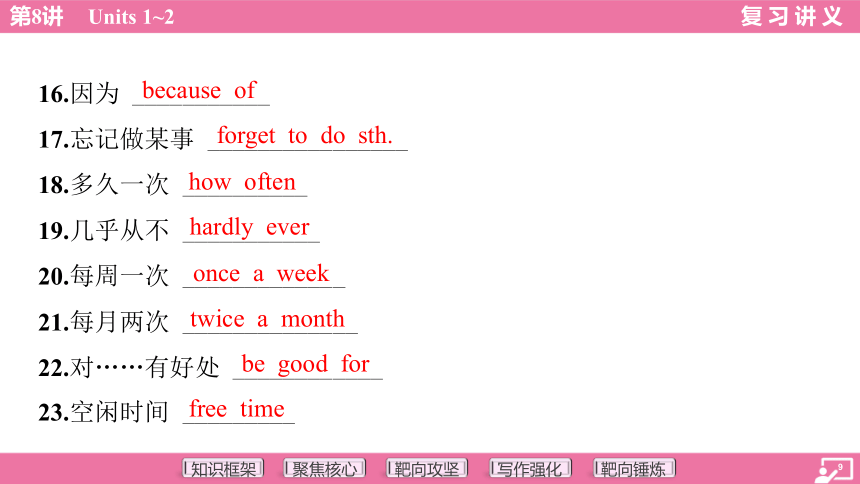
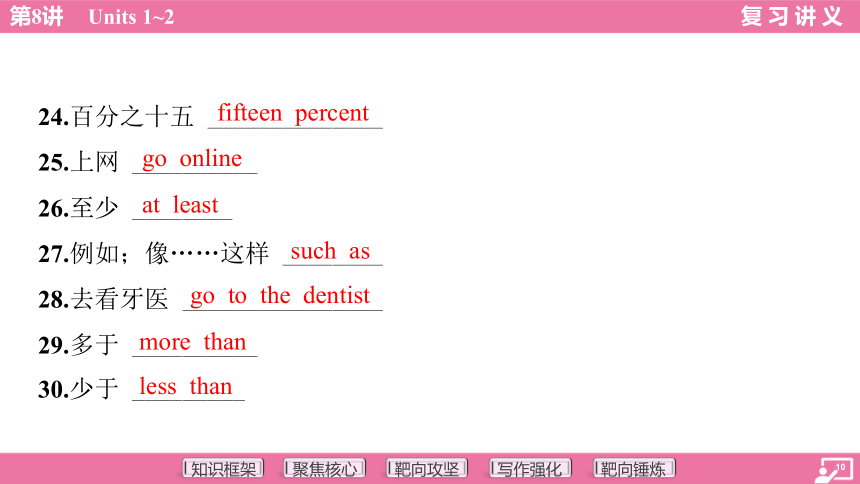
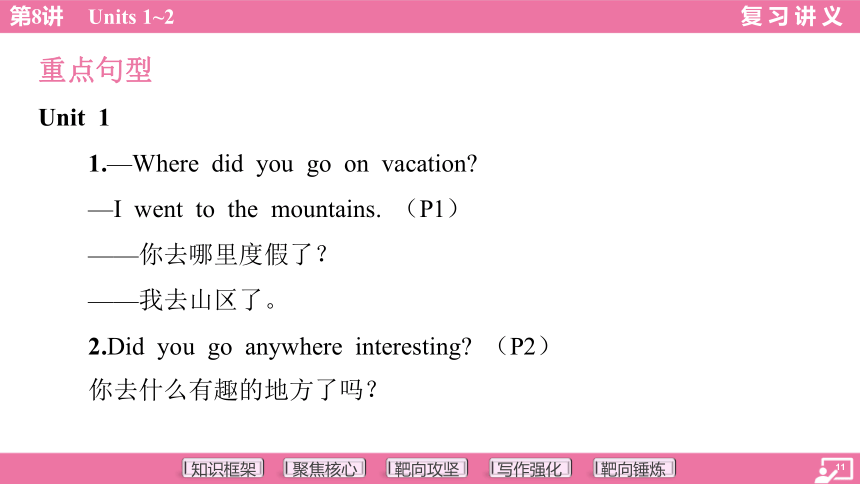
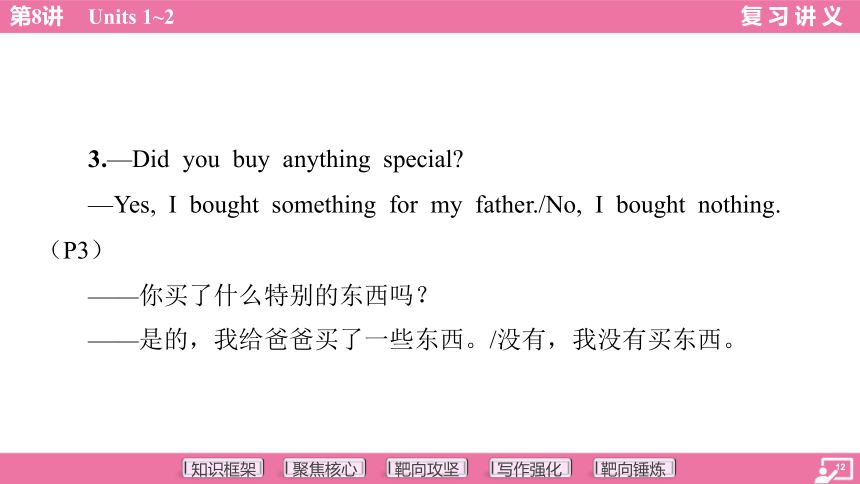
文档简介
(共55张PPT)
复 习 讲 义
第一篇 夯实根基
专题三 八年级上册
第8讲 Units 1~2
知识框架
第8讲 Units 1~2
聚焦核心
词语拓展
1.wonderful adj. 精彩的;绝妙的→ ________ n. 奇观
2.most adj. & adv. 最多(最高级)→ ______ adj. & adv. 较多
(比较级)
3.myself pron. 我自己→ __ pron. 我(主格)
4.yourself pron. 你(们)自己→ _____ pron. 你;你们(主格)
5.bored adj. 厌倦的;烦闷的(形容人)→ _______ adj. 无聊的;令人
厌烦的(形容事物)
6.enjoyable adj. 有乐趣的;令人愉快的→ ______ v. 从……中获得乐趣
wonder
more
I
you
boring
enjoy
7.decide v. 决定→ ________ n. 决定
8.building n. 建筑物;房子→ ______ v. 建造
9.difference n. 差别;差异→ _________ adj. 不同的
10.dislike v.& n. 不喜爱(的事物);厌恶(的事物)→ _____ v. 喜欢
11.least adj. & adv. 最小(的);最少(的)(little的最高级)→
_____ adj. & adv. 较小(的);较少(的)(little的比较级)
12.health n. 健康→ ________ adj. 健康的
13.die v. 死亡→ ______ n. 死亡
14.writer n. 作者;作家→ ______ v. 写
decision
build
different
like
less
healthy
death
write
重点短语
1.去山区/山里 ___________________
2.相当多 ____________
3.记日记 ____________
4.在周末 _____________
5.互联网的使用 __________________
6.在……方面帮助……__________
7.去度假 ______________
go to the mountains
quite a few
keep a diary
on weekends
use of the Internet
help with
go on vacation
8.待在家里 _____________
9.外出 _______
10.去购物 ____________
11.当然 __________
12.决定做某事 ________________
13.给……的感觉 _________
14.在过去 ___________
15.四处走走 ____________
stay at home
go out
go shopping
of course
decide to do sth.
feel like
in the past
walk around
16.因为 ___________
17.忘记做某事 ________________
18.多久一次 __________
19.几乎从不 ___________
20.每周一次 _____________
21.每月两次 ______________
22.对……有好处 ____________
23.空闲时间 _________
because of
forget to do sth.
how often
hardly ever
once a week
twice a month
be good for
free time
24.百分之十五 ______________
25.上网 __________
26.至少 ________
27.例如;像……这样 ________
28.去看牙医 ________________
29.多于 __________
30.少于 _________
fifteen percent
go online
at least
such as
go to the dentist
more than
less than
重点句型
Unit 1
1.—Where did you go on vacation
—I went to the mountains. (P1)
——你去哪里度假了?
——我去山区了。
2.Did you go anywhere interesting (P2)
你去什么有趣的地方了吗?
3.—Did you buy anything special
—Yes, I bought something for my father./No, I bought nothing.
(P3)
——你买了什么特别的东西吗?
——是的,我给爸爸买了一些东西。/没有,我没有买东西。
4.—How did you like it
—Well, it was my first time there, so everything was really
interesting. (P3)
——你觉得那里怎么样?
——嗯,这是我第一次去那儿,因此(觉得)那里的一切真的很有趣。
Unit 2
5.—What do you do on weekends
—I usually watch TV. (P9)
——你周末做什么?
——我通常看电视。
6.—Do you go shopping
—No, I never go shopping. (P9)
——你去购物吗?
——不,我从不去购物。
7.Next week is quite full for me,Jack. (P10)
我下周会相当忙 ,杰克。
8.—How often do you go to the movies
—I go to the movies maybe once a month. (P11)
——你多久看一次电影?
——我大概一个月去看一次电影。
9.The answers to our questions about watching television were also
interesting. (P13)
对我们提出的有关看电视的问题的回答也颇有意思。
10.Although many students like to watch sports, game shows are
the most popular. (P13)
尽管很多学生喜欢看运动类节目,但是游戏类节目是最受欢迎的。
第8讲 Units 1~2
靶向攻坚
考点1 复合不定代词。
复合不定代词是由some-,any-,no-,every-加上-one,-body,-
thing等所组成的不定代词。
1.复合不定代词一览表。
类 别 复合不定代词 指 人 指 物
some系列 somebody, someone某人;有人 something某事;某物
any系列 anybody, anyone任何人 anything任何事;任何东西
no系列 nobody, no one没有人;无人 nothing没有东西;没有什么
every系列 everybody, everyone每人 everything每件事;一切
2.复合不定代词的用法。
(1)复合不定代词都具有单数的含义,因此通常被看成是第三人
称单数。当它们充当句子的主语时,其后的谓语动词用单数形式。例如:
Nothing is difficult if you put your heart into it.世上无难事,只怕
有心人。
(2)something,someone,somebody通常用于肯定句中,而
anything,anyone,anybody一般用于否定句、疑问句或条件状语从句中。
例如:
There’s something wrong with his computer. 他的电脑出了些问题。
Do you have anything to say 你有话要说吗
I didn’t see anybody in the classroom. 我没在教室里见到任何人。
(3)在表示请求、邀请、提建议等带有委婉语气的疑问句,和希
望得到对方肯定答复的疑问句,以及表示反问的问句中,也用something,
someone,somebody等复合不定代词。例如:
Would you like something to eat 你想要些吃的东西吗
(4)当anything表示“任何事(物),无论何事(物)”,anyone,
anybody表示“无论谁,任何人”等意义时,它们也可以用于肯定句中。
例如:
Anything is OK.什么都行。
Anybody knows the answer.任何人都知道答案。
(5)复合不定代词的定语必须后置,即放在复合不定代词的后面。
例如:
I have something important to tell you.我有些重要的事情要告诉你
们。
考点精练
1.It was too dark in the room and Linda could see ________
there.( )
A
A.nothing B.anything C.something
2.Children like this book because there’s ________ interesting in
it.( )
B
A.anything B.something C.nothing
3.I feel so tired that I don’t want to do ________.( )
B
A.something B.anything C.nothing
4.—Sam, ________ is waiting for you outside the dining hall.
—Oh, thank you. That may be my cousin.( )
A
A.someone B.anyone C.everyone
5.—Can I tell my best friend about it
—No. I don’t want ________ else to know.( )
B
A.everyone B.anyone C.someone
考点2 一般现在时的用法。
1.定义:一般现在时表示现在经常发生或反复发生的动作、存在的状态或习惯性动作的时态。
2.构成:
(1)一般现在时用行为动词的原形,但第三人称单数作主语时,动词要用第三人称单数形式。动词第三人称单数变化规律如下:一般情况在动词的词尾加-s; 以s,x,o,ch,sh结尾的动词加-es;以“辅音字母+y”结尾的动词改y为i再加-es。
(2)一般现在时be动词的变化:主语是第一人称单数时用am;主语是第三人称单数时用is;其他人称用are。
3.用法:
(1)表示经常性或习惯性的动作,常与表示频率的时间状语
always, usually, often, sometimes, twice a week, seldom, once a month,
hardly ever, never, every morning/night/evening/day/week等连用。例如:
Tony goes to the library once a week.
托尼每周去一次图书馆。
(2)表示现在的状态。例如:
She is tall and thin. 她又高又瘦。
(3)表示客观事实或普遍真理。例如:
The sun rises in the east and sets in the west. 太阳从东边升起,
从西边落下。
考点精练
1.He often ____ (have) dinner at home.
2.____ your parents _____ (read) newspapers every day?
has
Do
read
考点3 because of和because的用法区别。
词 语 词 性 释 义 用 法
because of 介词短语 因为 其后可跟名词(短语)、代词或
动名词
because 连词 因为 引导原因状语从句,表示直接、
明确的原因或理由
考点精练
1.We didn’t go for a picnic ________ the heavy rain.( )
C
A.because B.so C.because of
2.I was late for school ________the bus was too crowded for me to
get on.( )
A
A.because B.because of C.so
考点4 sometimes, sometime, some time和some times的用法
区别。
词 语 词义 区 别 例 句
sometimes 有时 频率副词,常与一 般现在时或一般过 去时连用 I sometimes write to him.
我有时给他写信。
词 语 词义 区 别 例 句
sometime 某时 表示在某个不确定 的时间,常与表示 将来或过去的时间 状语连用 I saw him sometime in
May.我是在5月某个时候见
到他的。
续表
词 语 词义 区 别 例 句
some time 一段时间 通常在句子中作时 间状语,也可用作 副词词组,当用来 指将来一个未肯定 的时刻时,可与 sometime通用 I want to go to my
hometown and have a
holiday for some time.我想回老家休假一段时间。
续表
词 语 词义 区 别 例 句
some times 几次, 几倍 其中的time意为 “次,倍”,是可数 名词 This city is some times as big as Liuzhou.这个城市(的面积)比柳州大几倍。
续表
考点精练
some time sometime some times sometimes
1.He often comes by bike and __________ by bus.
2.I have been to the Great Wall ___________.
3.Good! So I’ll call you _________ during the week and we’ll make a
plan for the vacation.
4.He will do it. Don’t worry, but it’ll take him __________!
sometimes
some times
sometime
some time
考点5 through和across的用法区别。
单词 词义 区 别 例 句
through 穿越, 横穿 表示从物体内部穿 过,如穿过森林、 隧道等 It took us two hours to walk
through the forest.我们花了两个小时才穿过这片森林。
across 穿过, 越过 表示从物体表面经 过,如过马路、过 桥、过河等 She swam across the river.她游过了河。
考点精练
1.The moonlight is shining in ________ the window. Everything in the
room looks nice.( )
C
A.over B.across C.through
2.—Excuse me, where is the bookstore
—Go ________ the bridge. You will see it on your left.( )
B
A.through B.across C.over
第8讲 Units 1~2
写作强化
主题:度假时光
写作强化
请以“My Happy Trip”为题,写一篇80词左右的短文,给大家介绍
你的一次快乐之旅。要求包括以下内容:1.旅游时间、地点;2.和哪些人
一起去的;3.天气情况和交通方式;4.旅游过程中所经历的活动。
_____________________________________________________________
______________________________________________________________
______________________________________________________________
______________________________________________________________
______________________________________________________________
______________________________________________________________
______________________________________________________________
______________________________________________________________
______________________________________________________________
______________________________________________________________
My Happy Trip
Last summer, I went to the beach with my family. It was a sunny
day, perfect for playing in the sand and water. We drove there in our
car, singing songs along the way.
At the beach, we built sandcastles, played volleyball on the sand,
swam in the sea, and ate the delicious food we brought. My brother
and I even found some pretty shells to take home.
I felt very happy and relaxed on this trip. It was great to spend
time with my family outside, enjoying the sun and the sea. I love our
beach days and can’t wait to go back again!
审题谋篇
审主题 快乐的旅行
审人称 第一人称
审时态 一般过去时
审要点 ①时间、地点 ②旅游同行人 ③天气情况和交通方式 ④旅
游过程中所经历的活动
审结构 开篇:介绍旅行地点和同行人
中间:描述天气和选择的交通工具,介绍旅行中经历的活动
结尾:分享旅行的感受
常用词句 [词语]
sunny, rainy, cloudy, happy, fun, exciting
[句型]
①It was a...day.
②I went to the beach with my family.
③I felt very happy and relaxed on this trip.
续表
第8讲 Units 1~2
靶向锤炼
一、单项选择。
1.—Where did you go last month
—I took a trip to Yunnan. It’s ________ enjoyable trip.( )
B
A.a B.an C.the
2.The model plane is ________. I made it by ________.( )
C
A.my; me B.my; myself C.mine; myself
3.Life is not ________ good, but we have to move on.( )
A
A.always B.often C.hardly
4.Money is important in our lives, but it isn’t ________.( )
C
A.something B.anything C.everything
5.Summer vacation is coming. Linda decided ________ to drive.( )
B
A.learning B.to learn C.learn
6.If there is ________ along the way, we could also make a stop for
some days.( )
B
A.interesting anywhere
B.anywhere interesting
C.interesting everywhere
7.I’m sure you will be a good basketball player ________ hard
work.( )
C
A.from B.with C.through
8.Mrs. Green has three sons, but ________ of them live with
her.( )
B
A.some B.none C.any
9.This is an old movie, so ________ young people know about
it.( )
B
A.a few B.few C.a little
10.—________ do you have a sports meeting in your school, Tim
—Every year.( )
A
A.How often B.How soon C.How long
二、用括号内所给单词的正确形式填空。
1.—Where did you go last weekend, Lily
—Oh, I went to Beijing and visited the Palace Museum. It was really
__________(wonder).
wonderful
2.Lu Xun, Qian Zhongshu and Cao Yu are all my favorite Chinese
_______(write).
3.Amy makes fewer mistakes than Peter. She does her homework
_________ (careful).
writers
carefully
4.With the help of a dictionary, I can read some English __________
(magazine).
5.Remember, we have two ears and one mouth, so let’s speak _____
(little) and listen more.
6.Skating and swimming are my favorite _________ (activity)in my
free time.
7.Molly, help ________(you) to some cakes.
magazines
less
activities
yourself
8.Susan ________ (dislike)this kind of music because it’s too noisy.
9.Look! Some of the students are pulling ___________(they) up the
rocks.
10.Thank you for ________ me to the party. I’m grateful to you for
your _________. (invite)
dislikes
themselves
inviting
invitation
三、从方框中选择恰当的单词,并用其正确形式填空。每个单
词只能用一次。
for buildings three I hungry bored
wonderful enjoyable waited decide
My parents are always very busy with their work. When I don’t
need to go to school, I have to stay at home by 1._______.
Sometimes I feel really 2.______ and want to go on a trip.
Luckily, last week my parents had a four-day vacation, so they
3.________ to take me to Guilin by train.
myself
bored
decided
When we got to the station, we saw many people there and we
4._______ over an hour for the train.
Guilin is a(n)5.__________ city with beautiful scenery. There
are new 6._________everywhere in the city. People there are friendly
and the streets are very clean. On the second day after we arrived
there, we rented (租用) three bicycles and rode them around the
city. When we were 7._______, we stopped to eat some local food. On
the 8.______ day, we took a boat trip along the Lijiang River to
Yangshuo. On the way, we saw mountains of different shapes. They
look like different things. 9._____ example, some look like animals.a
We spent three days in Guilin and had a(n) 10._________ time.
waited
wonderful
buildings
hungry
third
For
enjoyable
for buildings three I hungry bored
wonderful enjoyable waited decide
四、完形填空。
One day, the father of a very wealthy family took his son on a
trip to the country. The father wanted to show the son how poor
people lived. They spent a couple of days and nights on the . .1. . of
what would be considered a very poor family.
On their return from the trip, the father asked his son, “. .2. . was
the trip ”
“It was great, Dad.”
“Did you see how poor people live ” the father asked.
“Oh yeah,” said the son.
“So, tell me, what did you learn from the trip ” asked the father.
The son answered, “I saw that we have one dog and they have
four. We have a pool that . .3. . to the middle of our garden and they
have a stream that has no end. We have imported (进口) . .4. . in
our garden and they have the stars at night. Our patio (天井)
reaches to the front yard and they have the . .5. . horizon (地平线).
We have a small piece of land to live on and they have fields that
go . .6. . our sight. We have servants who serve us, . .7. . they serve
others. We buy our food, but they grow theirs. We have walls around
our wealth to protect us, and they have friends to . .8. . them.”
The boy’s father was speechless. Then his son added, “Thanks
Dad for showing me how . .9. . we are.”
Isn’t perspective (角度) a wonderful thing Make you wonder
what will happen if we all give thanks for everything we have, instead
of . .10. . what we don’t have.
1.( ) A.farm B.factory C.park
A
2.( ) A.What B.How C.Where
B
3.( ) A.reaches B.belongs C.works
A
4.( ) A.moon B.clouds C.lanterns
C
5.( ) A.little B.half C.whole
C
6.( ) A.in B.beyond C.out
B
7.( ) A.but B.and C.so
A
8.( ) A.doubt B.protect C.stop
B
9.( ) A.rich B.common C.poor
C
10.( ) A.worrying about B.talking about C.learning about
B
复 习 讲 义
第一篇 夯实根基
专题三 八年级上册
第8讲 Units 1~2
知识框架
第8讲 Units 1~2
聚焦核心
词语拓展
1.wonderful adj. 精彩的;绝妙的→ ________ n. 奇观
2.most adj. & adv. 最多(最高级)→ ______ adj. & adv. 较多
(比较级)
3.myself pron. 我自己→ __ pron. 我(主格)
4.yourself pron. 你(们)自己→ _____ pron. 你;你们(主格)
5.bored adj. 厌倦的;烦闷的(形容人)→ _______ adj. 无聊的;令人
厌烦的(形容事物)
6.enjoyable adj. 有乐趣的;令人愉快的→ ______ v. 从……中获得乐趣
wonder
more
I
you
boring
enjoy
7.decide v. 决定→ ________ n. 决定
8.building n. 建筑物;房子→ ______ v. 建造
9.difference n. 差别;差异→ _________ adj. 不同的
10.dislike v.& n. 不喜爱(的事物);厌恶(的事物)→ _____ v. 喜欢
11.least adj. & adv. 最小(的);最少(的)(little的最高级)→
_____ adj. & adv. 较小(的);较少(的)(little的比较级)
12.health n. 健康→ ________ adj. 健康的
13.die v. 死亡→ ______ n. 死亡
14.writer n. 作者;作家→ ______ v. 写
decision
build
different
like
less
healthy
death
write
重点短语
1.去山区/山里 ___________________
2.相当多 ____________
3.记日记 ____________
4.在周末 _____________
5.互联网的使用 __________________
6.在……方面帮助……__________
7.去度假 ______________
go to the mountains
quite a few
keep a diary
on weekends
use of the Internet
help with
go on vacation
8.待在家里 _____________
9.外出 _______
10.去购物 ____________
11.当然 __________
12.决定做某事 ________________
13.给……的感觉 _________
14.在过去 ___________
15.四处走走 ____________
stay at home
go out
go shopping
of course
decide to do sth.
feel like
in the past
walk around
16.因为 ___________
17.忘记做某事 ________________
18.多久一次 __________
19.几乎从不 ___________
20.每周一次 _____________
21.每月两次 ______________
22.对……有好处 ____________
23.空闲时间 _________
because of
forget to do sth.
how often
hardly ever
once a week
twice a month
be good for
free time
24.百分之十五 ______________
25.上网 __________
26.至少 ________
27.例如;像……这样 ________
28.去看牙医 ________________
29.多于 __________
30.少于 _________
fifteen percent
go online
at least
such as
go to the dentist
more than
less than
重点句型
Unit 1
1.—Where did you go on vacation
—I went to the mountains. (P1)
——你去哪里度假了?
——我去山区了。
2.Did you go anywhere interesting (P2)
你去什么有趣的地方了吗?
3.—Did you buy anything special
—Yes, I bought something for my father./No, I bought nothing.
(P3)
——你买了什么特别的东西吗?
——是的,我给爸爸买了一些东西。/没有,我没有买东西。
4.—How did you like it
—Well, it was my first time there, so everything was really
interesting. (P3)
——你觉得那里怎么样?
——嗯,这是我第一次去那儿,因此(觉得)那里的一切真的很有趣。
Unit 2
5.—What do you do on weekends
—I usually watch TV. (P9)
——你周末做什么?
——我通常看电视。
6.—Do you go shopping
—No, I never go shopping. (P9)
——你去购物吗?
——不,我从不去购物。
7.Next week is quite full for me,Jack. (P10)
我下周会相当忙 ,杰克。
8.—How often do you go to the movies
—I go to the movies maybe once a month. (P11)
——你多久看一次电影?
——我大概一个月去看一次电影。
9.The answers to our questions about watching television were also
interesting. (P13)
对我们提出的有关看电视的问题的回答也颇有意思。
10.Although many students like to watch sports, game shows are
the most popular. (P13)
尽管很多学生喜欢看运动类节目,但是游戏类节目是最受欢迎的。
第8讲 Units 1~2
靶向攻坚
考点1 复合不定代词。
复合不定代词是由some-,any-,no-,every-加上-one,-body,-
thing等所组成的不定代词。
1.复合不定代词一览表。
类 别 复合不定代词 指 人 指 物
some系列 somebody, someone某人;有人 something某事;某物
any系列 anybody, anyone任何人 anything任何事;任何东西
no系列 nobody, no one没有人;无人 nothing没有东西;没有什么
every系列 everybody, everyone每人 everything每件事;一切
2.复合不定代词的用法。
(1)复合不定代词都具有单数的含义,因此通常被看成是第三人
称单数。当它们充当句子的主语时,其后的谓语动词用单数形式。例如:
Nothing is difficult if you put your heart into it.世上无难事,只怕
有心人。
(2)something,someone,somebody通常用于肯定句中,而
anything,anyone,anybody一般用于否定句、疑问句或条件状语从句中。
例如:
There’s something wrong with his computer. 他的电脑出了些问题。
Do you have anything to say 你有话要说吗
I didn’t see anybody in the classroom. 我没在教室里见到任何人。
(3)在表示请求、邀请、提建议等带有委婉语气的疑问句,和希
望得到对方肯定答复的疑问句,以及表示反问的问句中,也用something,
someone,somebody等复合不定代词。例如:
Would you like something to eat 你想要些吃的东西吗
(4)当anything表示“任何事(物),无论何事(物)”,anyone,
anybody表示“无论谁,任何人”等意义时,它们也可以用于肯定句中。
例如:
Anything is OK.什么都行。
Anybody knows the answer.任何人都知道答案。
(5)复合不定代词的定语必须后置,即放在复合不定代词的后面。
例如:
I have something important to tell you.我有些重要的事情要告诉你
们。
考点精练
1.It was too dark in the room and Linda could see ________
there.( )
A
A.nothing B.anything C.something
2.Children like this book because there’s ________ interesting in
it.( )
B
A.anything B.something C.nothing
3.I feel so tired that I don’t want to do ________.( )
B
A.something B.anything C.nothing
4.—Sam, ________ is waiting for you outside the dining hall.
—Oh, thank you. That may be my cousin.( )
A
A.someone B.anyone C.everyone
5.—Can I tell my best friend about it
—No. I don’t want ________ else to know.( )
B
A.everyone B.anyone C.someone
考点2 一般现在时的用法。
1.定义:一般现在时表示现在经常发生或反复发生的动作、存在的状态或习惯性动作的时态。
2.构成:
(1)一般现在时用行为动词的原形,但第三人称单数作主语时,动词要用第三人称单数形式。动词第三人称单数变化规律如下:一般情况在动词的词尾加-s; 以s,x,o,ch,sh结尾的动词加-es;以“辅音字母+y”结尾的动词改y为i再加-es。
(2)一般现在时be动词的变化:主语是第一人称单数时用am;主语是第三人称单数时用is;其他人称用are。
3.用法:
(1)表示经常性或习惯性的动作,常与表示频率的时间状语
always, usually, often, sometimes, twice a week, seldom, once a month,
hardly ever, never, every morning/night/evening/day/week等连用。例如:
Tony goes to the library once a week.
托尼每周去一次图书馆。
(2)表示现在的状态。例如:
She is tall and thin. 她又高又瘦。
(3)表示客观事实或普遍真理。例如:
The sun rises in the east and sets in the west. 太阳从东边升起,
从西边落下。
考点精练
1.He often ____ (have) dinner at home.
2.____ your parents _____ (read) newspapers every day?
has
Do
read
考点3 because of和because的用法区别。
词 语 词 性 释 义 用 法
because of 介词短语 因为 其后可跟名词(短语)、代词或
动名词
because 连词 因为 引导原因状语从句,表示直接、
明确的原因或理由
考点精练
1.We didn’t go for a picnic ________ the heavy rain.( )
C
A.because B.so C.because of
2.I was late for school ________the bus was too crowded for me to
get on.( )
A
A.because B.because of C.so
考点4 sometimes, sometime, some time和some times的用法
区别。
词 语 词义 区 别 例 句
sometimes 有时 频率副词,常与一 般现在时或一般过 去时连用 I sometimes write to him.
我有时给他写信。
词 语 词义 区 别 例 句
sometime 某时 表示在某个不确定 的时间,常与表示 将来或过去的时间 状语连用 I saw him sometime in
May.我是在5月某个时候见
到他的。
续表
词 语 词义 区 别 例 句
some time 一段时间 通常在句子中作时 间状语,也可用作 副词词组,当用来 指将来一个未肯定 的时刻时,可与 sometime通用 I want to go to my
hometown and have a
holiday for some time.我想回老家休假一段时间。
续表
词 语 词义 区 别 例 句
some times 几次, 几倍 其中的time意为 “次,倍”,是可数 名词 This city is some times as big as Liuzhou.这个城市(的面积)比柳州大几倍。
续表
考点精练
some time sometime some times sometimes
1.He often comes by bike and __________ by bus.
2.I have been to the Great Wall ___________.
3.Good! So I’ll call you _________ during the week and we’ll make a
plan for the vacation.
4.He will do it. Don’t worry, but it’ll take him __________!
sometimes
some times
sometime
some time
考点5 through和across的用法区别。
单词 词义 区 别 例 句
through 穿越, 横穿 表示从物体内部穿 过,如穿过森林、 隧道等 It took us two hours to walk
through the forest.我们花了两个小时才穿过这片森林。
across 穿过, 越过 表示从物体表面经 过,如过马路、过 桥、过河等 She swam across the river.她游过了河。
考点精练
1.The moonlight is shining in ________ the window. Everything in the
room looks nice.( )
C
A.over B.across C.through
2.—Excuse me, where is the bookstore
—Go ________ the bridge. You will see it on your left.( )
B
A.through B.across C.over
第8讲 Units 1~2
写作强化
主题:度假时光
写作强化
请以“My Happy Trip”为题,写一篇80词左右的短文,给大家介绍
你的一次快乐之旅。要求包括以下内容:1.旅游时间、地点;2.和哪些人
一起去的;3.天气情况和交通方式;4.旅游过程中所经历的活动。
_____________________________________________________________
______________________________________________________________
______________________________________________________________
______________________________________________________________
______________________________________________________________
______________________________________________________________
______________________________________________________________
______________________________________________________________
______________________________________________________________
______________________________________________________________
My Happy Trip
Last summer, I went to the beach with my family. It was a sunny
day, perfect for playing in the sand and water. We drove there in our
car, singing songs along the way.
At the beach, we built sandcastles, played volleyball on the sand,
swam in the sea, and ate the delicious food we brought. My brother
and I even found some pretty shells to take home.
I felt very happy and relaxed on this trip. It was great to spend
time with my family outside, enjoying the sun and the sea. I love our
beach days and can’t wait to go back again!
审题谋篇
审主题 快乐的旅行
审人称 第一人称
审时态 一般过去时
审要点 ①时间、地点 ②旅游同行人 ③天气情况和交通方式 ④旅
游过程中所经历的活动
审结构 开篇:介绍旅行地点和同行人
中间:描述天气和选择的交通工具,介绍旅行中经历的活动
结尾:分享旅行的感受
常用词句 [词语]
sunny, rainy, cloudy, happy, fun, exciting
[句型]
①It was a...day.
②I went to the beach with my family.
③I felt very happy and relaxed on this trip.
续表
第8讲 Units 1~2
靶向锤炼
一、单项选择。
1.—Where did you go last month
—I took a trip to Yunnan. It’s ________ enjoyable trip.( )
B
A.a B.an C.the
2.The model plane is ________. I made it by ________.( )
C
A.my; me B.my; myself C.mine; myself
3.Life is not ________ good, but we have to move on.( )
A
A.always B.often C.hardly
4.Money is important in our lives, but it isn’t ________.( )
C
A.something B.anything C.everything
5.Summer vacation is coming. Linda decided ________ to drive.( )
B
A.learning B.to learn C.learn
6.If there is ________ along the way, we could also make a stop for
some days.( )
B
A.interesting anywhere
B.anywhere interesting
C.interesting everywhere
7.I’m sure you will be a good basketball player ________ hard
work.( )
C
A.from B.with C.through
8.Mrs. Green has three sons, but ________ of them live with
her.( )
B
A.some B.none C.any
9.This is an old movie, so ________ young people know about
it.( )
B
A.a few B.few C.a little
10.—________ do you have a sports meeting in your school, Tim
—Every year.( )
A
A.How often B.How soon C.How long
二、用括号内所给单词的正确形式填空。
1.—Where did you go last weekend, Lily
—Oh, I went to Beijing and visited the Palace Museum. It was really
__________(wonder).
wonderful
2.Lu Xun, Qian Zhongshu and Cao Yu are all my favorite Chinese
_______(write).
3.Amy makes fewer mistakes than Peter. She does her homework
_________ (careful).
writers
carefully
4.With the help of a dictionary, I can read some English __________
(magazine).
5.Remember, we have two ears and one mouth, so let’s speak _____
(little) and listen more.
6.Skating and swimming are my favorite _________ (activity)in my
free time.
7.Molly, help ________(you) to some cakes.
magazines
less
activities
yourself
8.Susan ________ (dislike)this kind of music because it’s too noisy.
9.Look! Some of the students are pulling ___________(they) up the
rocks.
10.Thank you for ________ me to the party. I’m grateful to you for
your _________. (invite)
dislikes
themselves
inviting
invitation
三、从方框中选择恰当的单词,并用其正确形式填空。每个单
词只能用一次。
for buildings three I hungry bored
wonderful enjoyable waited decide
My parents are always very busy with their work. When I don’t
need to go to school, I have to stay at home by 1._______.
Sometimes I feel really 2.______ and want to go on a trip.
Luckily, last week my parents had a four-day vacation, so they
3.________ to take me to Guilin by train.
myself
bored
decided
When we got to the station, we saw many people there and we
4._______ over an hour for the train.
Guilin is a(n)5.__________ city with beautiful scenery. There
are new 6._________everywhere in the city. People there are friendly
and the streets are very clean. On the second day after we arrived
there, we rented (租用) three bicycles and rode them around the
city. When we were 7._______, we stopped to eat some local food. On
the 8.______ day, we took a boat trip along the Lijiang River to
Yangshuo. On the way, we saw mountains of different shapes. They
look like different things. 9._____ example, some look like animals.a
We spent three days in Guilin and had a(n) 10._________ time.
waited
wonderful
buildings
hungry
third
For
enjoyable
for buildings three I hungry bored
wonderful enjoyable waited decide
四、完形填空。
One day, the father of a very wealthy family took his son on a
trip to the country. The father wanted to show the son how poor
people lived. They spent a couple of days and nights on the . .1. . of
what would be considered a very poor family.
On their return from the trip, the father asked his son, “. .2. . was
the trip ”
“It was great, Dad.”
“Did you see how poor people live ” the father asked.
“Oh yeah,” said the son.
“So, tell me, what did you learn from the trip ” asked the father.
The son answered, “I saw that we have one dog and they have
four. We have a pool that . .3. . to the middle of our garden and they
have a stream that has no end. We have imported (进口) . .4. . in
our garden and they have the stars at night. Our patio (天井)
reaches to the front yard and they have the . .5. . horizon (地平线).
We have a small piece of land to live on and they have fields that
go . .6. . our sight. We have servants who serve us, . .7. . they serve
others. We buy our food, but they grow theirs. We have walls around
our wealth to protect us, and they have friends to . .8. . them.”
The boy’s father was speechless. Then his son added, “Thanks
Dad for showing me how . .9. . we are.”
Isn’t perspective (角度) a wonderful thing Make you wonder
what will happen if we all give thanks for everything we have, instead
of . .10. . what we don’t have.
1.( ) A.farm B.factory C.park
A
2.( ) A.What B.How C.Where
B
3.( ) A.reaches B.belongs C.works
A
4.( ) A.moon B.clouds C.lanterns
C
5.( ) A.little B.half C.whole
C
6.( ) A.in B.beyond C.out
B
7.( ) A.but B.and C.so
A
8.( ) A.doubt B.protect C.stop
B
9.( ) A.rich B.common C.poor
C
10.( ) A.worrying about B.talking about C.learning about
B
